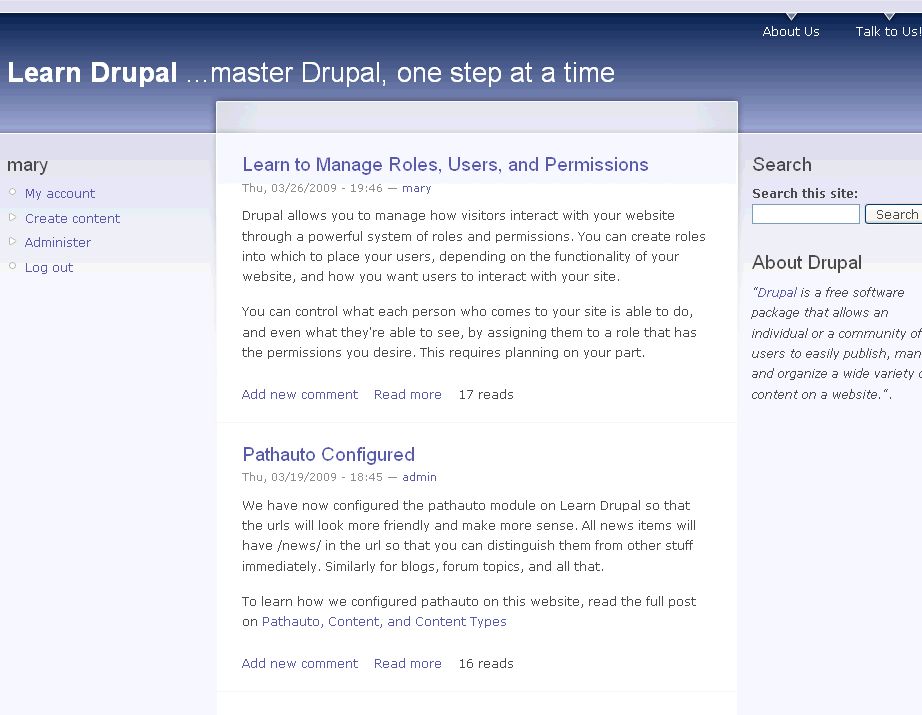Drupal 7 Alpha 1 was released a few days ago, on January 15, 2010. This is an exciting release for the Drupal community and Drupal fans everywhere. Drupal 7 has introduced some exciting new changes in terms of a new admin UI and incorporation of major elements of CCK into the core. In this screencast, we will install the alpha1 version and explore the backend a bit.
Tag Archives Drupal
I'm excited to announce a new blog contest at the Coding Pad today!! :) In partnership with Dorien Herremans, author of the Drupal 6: Ultimate Community Site Guide ebook, we will be running a blog contest focused on building community websites with Drupal. I've been building a series of Drupal beginner tutorials here, but I'm sure you're itching to learn more, build more, and explore Drupal's power past the basics. Well, here's a suggestion for you - build a community website!! How? By getting and learning, and working along with an excellent book - Drupal 6: Ultimate Community Site Guide ebook!! :) Up for grabs are three copies of this awesome ebook that walks you step by step through the process of building a Community Website using Drupal. I wrote my inital impressions about this book in a prior blog post (Drupal 6: Ultimate Community Site Guide Book - Initial Impressions) - and since then have continued to be impressed by the author's approach and the content of the book. How to Enter: It's real easy!
This post was inspired by a conversation on Twitter, where @ShaneSponagle, my buddy and MODx guru extraordinaire :) asked me what my blog stats looked like with respect to interest in MODx vs. Drupal, since I blog about both platforms. What I'm going to present here is a simple, and yet not so simple answer to that question. Some disclaimers before I start:
- I'm not an expert on either platform, I just share what I know and I'm learning
- I'm not an expert at statistics or interpreting them
- I'm not making any statements about which CMS is "better" or "more popular" than the other
- In the grand scheme of things, I'm a small fish and this blog is just a small portion of the web, and so I don't pretend to represent any global trends
- I am working concurrently on two tutorial sets, one for Drupal and one for MODx
- They are both aimed at complete newbies, so the audience is comparable
- A lot of my top hits and searched are on posts in either tutorial series, with the exception of two other posts (one on Fedora and the other on splitting CSV files).
Welcome to part 12 of our tutorial on building a website with Drupal 6. Previously we covered: Part 1: Introduction Part 2: Installing Drupal 6 Part 3: Configuring your Site Part 4: Playing with Blocks Part 5: Playing with Modules Part 6: Playing with Themes Part 7: Installing Modules and Themes Part 8: Pathauto, Content, and Content Types Part 9: Users, Roles, and Permissions Part 1o: Reports - Keeping Track Part 11: Managing Spam and Comments As we go through this tutorials I am building a Drupal resource site called Learn Drupal. So far our website is shaping up really well, the basics are pretty much taken care of, and we're now looking to build on content, and start adding on more functionality, depending on the purpose of your website. In this installment, we're going to look at how to make formatting your content easier for yourself and your users.
Welcome to part 11 of our tutorial on building a website with Drupal 6. Previously we covered:
Part 1: Introduction
Part 2: Installing Drupal 6
Part 3: Configuring your Site
Part 4: Playing with Blocks
Part 5: Playing with Modules
Part 6: Playing with Themes
Part 7: Installing Modules and Themes
Part 8: Pathauto, Content, and Content Types
Part 9: Users, Roles, and Permissions
Part 1o: Reports - Keeping Track
As we go through this tutorials I am building a Drupal resource site called Learn Drupal.
So far our website looks like this: (you can click on the images for a larger view)
 As we've been building our website we've been aiming to have users and visitors interact with our website. One of the ways in which visitors interact with the Learn Drupal website is by leaving comments, and sometimes, spam. Today, we're going to look at some ways of managing comments and spam on our website.
As we've been building our website we've been aiming to have users and visitors interact with our website. One of the ways in which visitors interact with the Learn Drupal website is by leaving comments, and sometimes, spam. Today, we're going to look at some ways of managing comments and spam on our website.

